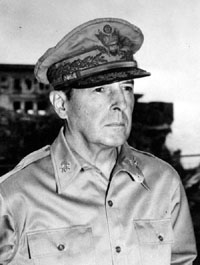 |
| Douglas MacArthur (http://www.medalofhonor.com/DouglasMacArthur.htm) |
General Douglas MacArthur was one of the most successful generals in the history of the United States and possibly the world. He fought in both World Wars and the Korean Conflict and received many prestigious awards.
On January 26, 1880, Douglas MacArthur was born at an army base in Arkansas to Arthur, a general, and Mary MacArthur. He had one brother, Arthur, who later followed up a career in the Navy. Although his formal education was interrupted due to his father’s military career, Douglas worked diligently and planned on attending the Military Academy at West Point. He achieved that goal in 1899 when he entered the renowned school. He was an outstanding student, above the norm in academics and athletics. In 1903, he left West Point to become a second lieutenant in the field of engineering. His assignments took him to the Philippines and San Francisco, later aiding his father as an observer of the Russo-Japanese War. After becoming a major, MacArthur was assigned to assist in the organization of the 42nd Infantry Division, which was assigned to the European front of World War I. Chief of Staff for the division, he entered France as a Colonel, later being promoted to brigadier general and assuming command of the 84th Infantry Brigade. MacArthur received several awards for bravery, including two Purple Hearts for his wounds, and was decorated for his tactical skill.
After finishing his service in Europe, MacArthur became superintendent of the Military Academy in 1919, helping to bring about several welcome changes. After that, he held several positions, including Army Chief of Staff. During this occupation, he pushed in Congress for reorganization of the army. Perhaps his most questionable act in this position, was his rout of the “Bonus Army” in 1932. Thousands of unemployed veterans of World War I poured into the capital, demanding payment of federal war bonuses. The police could not deal with the situation, and President Hoover ordered MacArthur to have the army remove the veterans. MacArthur carried out the order, completely driving them from the city. This act, thought to be uncalled for by some, caused many to fear MacArthur as a strict military dictator. In 1937, MacArthur retired from the United States Army and took a position as a field marshal in the military of the Philippines, which he had come to regard as his second home. He was married twice, first to Henrietta Louise Cromwell Brooks, and than to Jean Marie Faircloth, who he had a child with. Their son, Arthur, was born on February 2l, 1938.
When the Japanese initiated war in the Pacific through their bombing of Pearl Harbor, MacArthur returned to active duty as the commander of forces in the Far East setting up headquarters in the Philippine island of Corregidor. The Japanese moved ground force into the vicinity of Manila, the capital of the Philippines, forcing MacArthur to retreat and eventually evacuate to Australia. His famous quote “I shall return.” was a promise to the people of the Philippines, who he had grown to love. In the spring of 1942, the general received the Medal of Honor, the highest military honor in the United States. MacArthur brilliantly protected Australia, and through his technique of “island hopping” retook the South Pacific, including the Philippines. After the surrender of Japan, over which MacArthur preceded, he was named the commander of the occupation of Japan and helped bring the country into affluence and reform.
During the summer of 1950, the Korean Conflict started. MacArthur was placed in command of the UN forces in Korea and through brilliant planning in the attack on Inchon, retook South Korea. His forces advanced into the northern part of the peninsula, but they were stopped by a Chinese offensive, which caused them to retreat to the south. MacArthur wished to implement measures against China itself, but President Truman disagreed. When the general’s disagreement became public, Truman dismissed him from command. Returning to the United States for the first time in over a decade, he was welcomed like a hero. On April 19 he delivered the speech which contained the famous line “old soldiers never die, they just fade away.” After leaving the military, MacArthur nearly became the Republican presidential nominee and was a leading political figure. On April 5, 1964, the general died and was buried in a memorial in Norfolk, Virginia.
Page created on 3/20/2009 1:18:58 PM
Last edited 3/20/2009 1:18:58 PM
